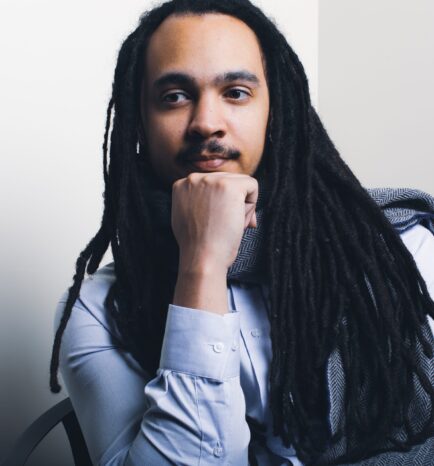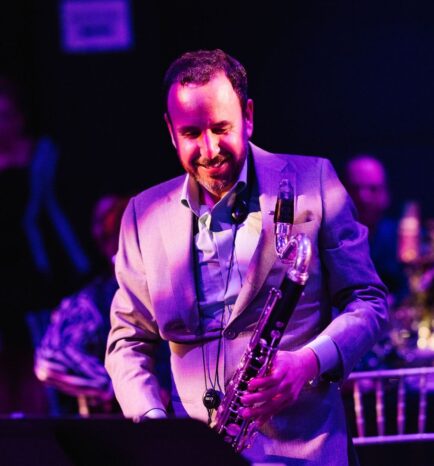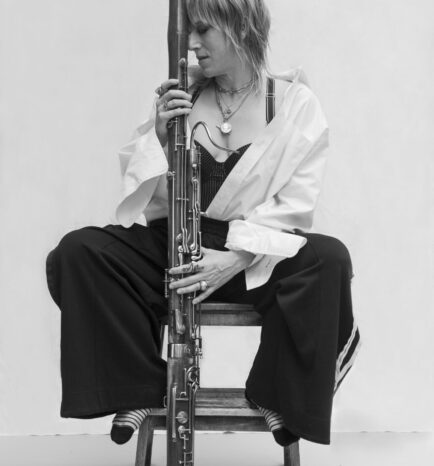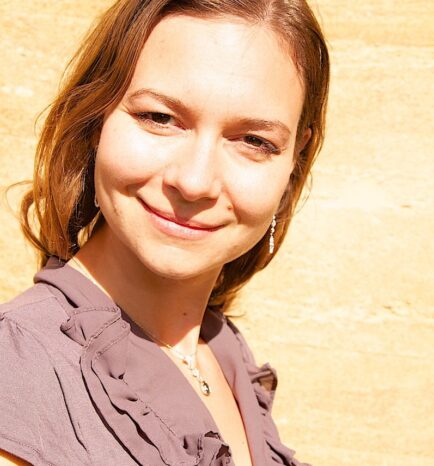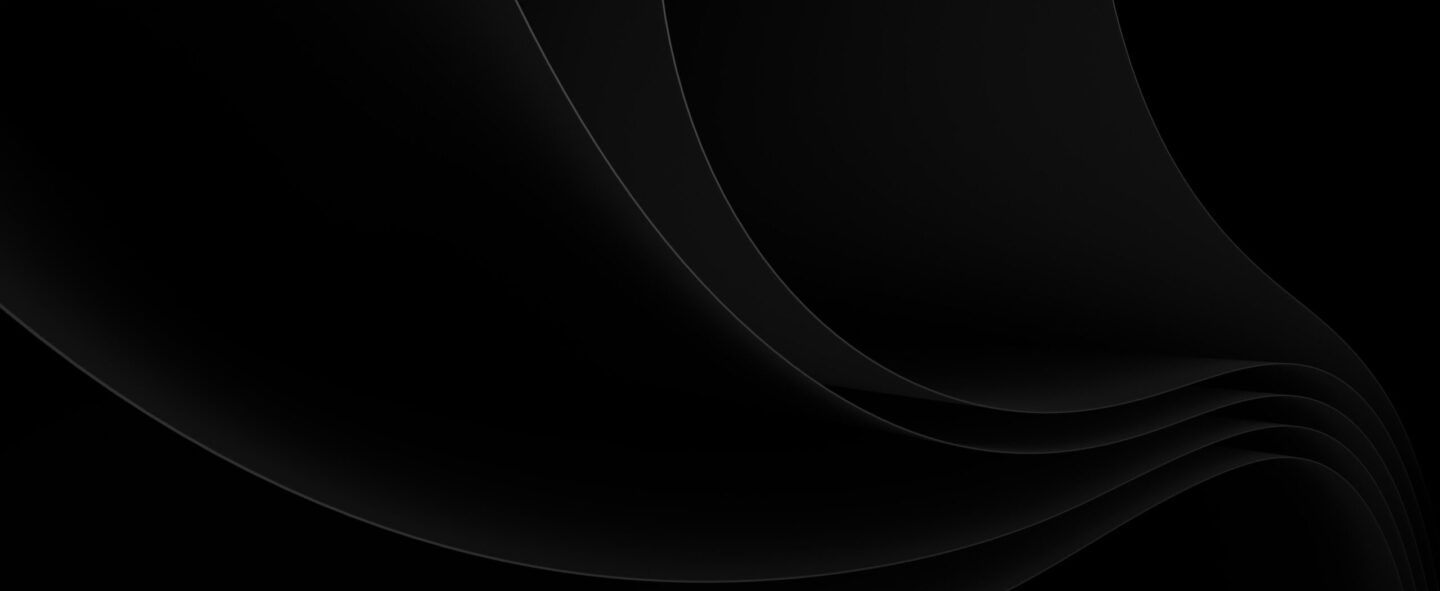
How does listening shape the way we perceive and inhabit the world? Swiss musician, composer, and scholar Jessie Cox, Assistant Professor of Music at Harvard University, explores this question at the intersection of music, technology, and critical thought.
During this event, Cox, with musicians Joshua Rubin and Rebekah Heller, introduces his piece Black/Blackness, which employs virtual acoustics to challenge our understanding of space and sound. By embedding the audience in a shifting, digitally altered reverberation, the performance reveals how acoustics influence our behaviors as listeners, speakers, and sound-makers. A game-like, interactive score further transforms the experience, dynamically altering the musical possibilities in response to movement. Within the piece, some musical behaviours bring us to more limited worlds, while others bring us to spaces richer in possibilities. Might we be able to learn to listen to that which seems impossible? Black/Blackness illustrates how complex systems can change through imaginative acts of creativity, making audible the unheard.
Following the performance, Cox will be joined by Nicole Sütterlin, Associate Professor of Germanic Languages and Literatures at Harvard University, to discuss the piece in the context of Cox’s scholarly work. Beyond virtual acoustics, Cox’s work explores the largely unheard histories of Black Swiss music, revealing how attentive listening can amplify voices that have long been marginalized. His interdisciplinary approach also extends to scientific collaborations, including work that draws connections between musical listening and the study of seismic activity.
Join us for an evening of deep listening and radical imagination, where music becomes a tool to reshape perception, space, and the possible futures we can hear into being.
Beyond the Alps is an event series that explores Swiss culture through a contemporary and future-oriented lens. Moving beyond traditional images of mountains, chocolate, and cheese, the series showcases the evolving and innovative faces of “Swissness” in the modern world.
Program
- 5:30pm – Doors open
- 6:00pm – Welcome remarks
- 6:15pm – Performance of Black/Blackness
- 6:30pm – Discussion
- 7:10pm – Q&A
- 7:30pm – Apéro
- 8:30pm – End
iCal / Outlook
Event start time
-
Boston
5:30PM
Bios
-
![]()
Bio
Jessie Cox
Assistant Professor, Harvard UniversityJessie Cox is Assistant Professor of Music at Harvard University and a scholar of experimental music as well as a composer and drummer. His first monograph Sounds of Black Switzerland: Blackness, Music, and Unthought Voices (Duke UP, 2025) addresses how thinking with blackness and experimental musical practices might afford the opening of new discourses, such as thematizing Black Swiss Life. Further recent publications can be found in Composing While Black (Wolke Verlag 2023), Hidden Heartache (Jungle Books 2024), liquid blackness, Critical Studies in Improvisation, array, Positionen Texte zur Aktuellen Musik, Sound American, and The American Music Review, amongst others.
Active as a composer, drummer, and scholar, his work thematizes questions at the intersection of black studies, music/sound studies, and critical theory. From Switzerland, with roots in Trinidad and Tobago, Cox thinks through questions of race, migration, national belonging, and our relation to the planet and the cosmos. A dedicated collaborator, Cox has worked as a composer and drummer with ensembles and institutions such as the Sun Ra Arkestra, LA Phil, Klangforum Wien, Ensemble Modern, and the International Contemporary Ensemble; at Festivals such as the Lucerne Festival, MaerzMusik, and Opera Omaha.
-
![]()
Bio
Joshua Nathan Rubin
Clarinetist, International Contemporary EnsembleJoshua Nathan Rubin served as the Program Director and then Artistic Director of the International Contemporary Ensemble from 2011-2018, where he oversaw the creative direction of hundreds of concerts in the United States and abroad. As a clarinetist, the New York Times has praised him as, “incapable of playing an inexpressive note.” His interest in electronic music has led him to work to make technologies easier to use for both composers and performers, and to build platforms for the collective management of ensembles. He has collaborated with the foremost composers and performers of our time, and this season is featured in performances on modern and on historical clarinets in New York, Los Angeles, Chicago, Portland, Houston, Geneva, Bergen, and Berlin, at Carnegie Hall, and at the Ojai Music Festival. Rubin serves on the faculty of the College of Performing Arts at The New School, Ensemble Evolution, and soundSCAPE Festival in Switzerland, teaching clarinet and electronic music. Joshua holds degrees in Biology and Clarinet from Oberlin College and Conservatory, and a Master’s degree from the Mannes School of Music. He maintains an artistic presence in New York and Los Angeles.
-
![]()
Bio
Rebekah Heller
Bassoonist, International Contemporary EnsembleAs a solo artist, Heller is known for creating immersive environments — using custom lights, commissioned clothing, and playing from memory — to facilitate electric connections with her audiences. A curious and unceasing advocate for the bassoon as a solo instrument, Heller has worked side-by-side with composers — Steve Reich, Ash Fure, Felipe Lara, George Lewis (and hundreds of others!) over the last decade to forge an exciting new repertoire of works for solo bassoon, bassoon with electronics, and chamber music featuring the bassoon. Many of these compositions can be found on her solo albums: 100 names, which was called “pensive and potent” by The New York Times, and METAFAGOTE, which ArtMusicLounge insists is “here to explode…any preconceived notions you may have had about bassoon music.” As bassoonist (since 2008) and former Co-Artistic Director of the International Contemporary Ensemble, Heller has been a passionate advocate for a more diverse and exciting musical landscape, spearheading landmark ICE commissioning programs and Co-Directing Ensemble Evolution at The New School.
-
![]()
Bio
Nicole Sütterlin
Associate Professor, Harvard UniversityNicole Sütterlin is an associate professor of Germanic Languages and Literatures at Harvard University. She earned her PhD from the University of Basel, where she taught before joining Harvard in 2014. Her research and teaching span German, European, and American literature and culture from the 18th century to the present, with particular emphasis on environmental humanities, history of science, and transnational memory and trauma studies. She is the author of Poetik der Wunde: Zur Entdeckung des Traumas in der Literatur der Romantik (“Poetics of the Wound: The Discovery of Trauma in Romantic Literature,” Wallstein 2019). In her current book project, Monstrous Microbes? Multispecies Bodies in the Posthuman Novel, she examines how contemporary fiction mobilizes the microbiome as a critical lens through which to address environmental crises.
